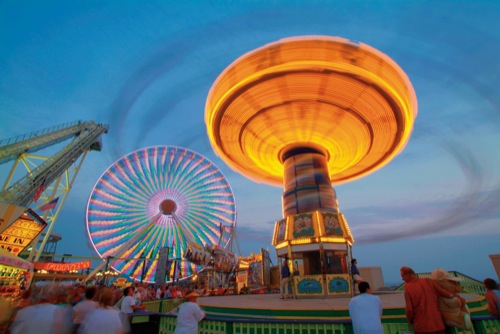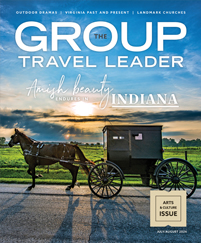
Courtesy Greater Wildwoods TIDA
From the elegance of the Victorian era to the classic colors of midcentury America and the energy of modern resort destinations, a trip down the coast of New Jersey gives visitors a look at interesting moments in the history of the East Coast.
With its long, narrow shape and prime location on the Atlantic Ocean, New Jersey enjoys some 130 miles of coastline, and proximity to New York and Philadelphia has long made the coastal communities in New Jersey popular vacation destinations. Today, groups that visit the state can see reflections of the way that Americans have vacationed there throughout the ages.
Cape May, with its large concentration of Victorian buildings and a peaceful community attitude, offers a view of New Jersey tourism as it was in the late 1800s. In the Wildwoods area, visitors experience art and architecture that hearken back to the golden age of Americana, the middle of the 20th century. And Atlantic City brings the trip into the modern age, providing a menu of contemporary casino resorts and a bustling boardwalk.
A Historic Cape
Located at the bottom tip of New Jersey, Cape May has a long heritage as a getaway for city dwellers.
“Cape May has a history of being a destination for recreation and restoration going back to the Victorian era,” said Susan Krysiak, communications manager at the Cape May Mid-Atlantic Center for Arts and Humanities, which offers tours of the town for visiting groups. “People would come here by steamship and by rail to escape the city’s heat and to enjoy the refreshment of the seaside and rejuvenate.”
Today, the aesthetic of the Victorian era persists throughout the small town. A fire in 1878 destroyed many of the town’s original structures. Because Victorian style was all the rage at the time, locals rebuilt their homes and businesses in the Victorian fashion, giving Cape May a large concentration of beautiful, colorful buildings.
“That’s one of the nuggets of information that people will learn on a trolley tour that the Mid-Atlantic Center offers to visitors,” Krysiak said. “It gives them an overview of Cape May’s history and architecture, which is steeped in the Victorian era because of the fire.”
The organization’s tours can take place with a step-on guide or aboard a trolley. Group leaders can choose from options that range from several hours in length to full-day excursions that highlight the area’s history, architecture and natural environment. Options include historic site visits, food and wine tours, shopping excursions and more.
The Cape May for a Day tour takes visitors to the Emien Physick Estate, the area’s only Victorian house museum, where they have lunch in the cafe on the grounds and meet the living-history interpreter who depicts the home’s original owner. From there, a tour of the island goes to the popular Washington Street Mall pedestrian area at the beachfront, as well as the 1859 Cape May Lighthouse.
“We’re surrounded by water on three sides,” Krysiak said, “so no trip would be complete without going up the 199 steps to the top of the Cape May Lighthouse. It’s the best view in town.”











